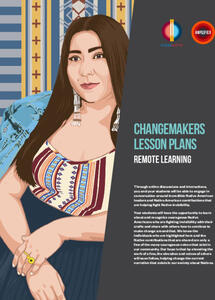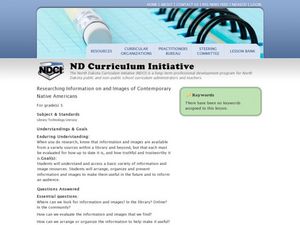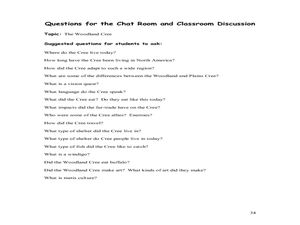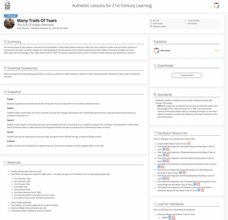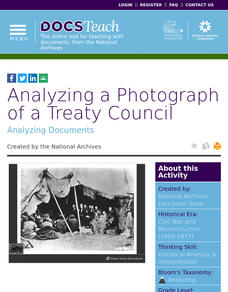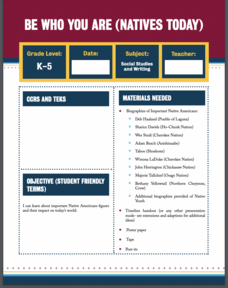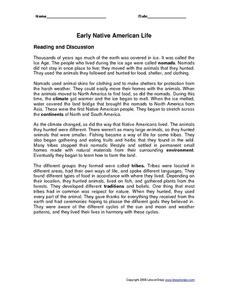Curated OER
Changemakers Lesson Plans
Teens and tweens are invited to become changemakers in a five-lesson unit, asking them to investigate and share what they have learned about exemplary, contemporary Native Americans. They gather facts about their research subject, record...
Curated OER
Researching information on and Images of Contemporary Native Americans
Research information and find pictures of Contemporary Native Americans in order to help 3rd graders understand what images are available from a variety of resources. They will present their research and pictures to the class. In turn,...
Indian Land Tenure Foundation
Native Foods and Livelihoods
Introduce young scholars to the ways in which land and people have a relationship. They examine the types of food local tribes have traditionally consumed and ways in which the people and the land both benefited from the act of...
Curated OER
Researching North American Tribes: The Cree
Students research the Cree tribe of North America. In this Native American lesson, students will research on-line, then compare and contrast the differences between the Cree tribe and other Native American tribes. Students will break...
Stanford University
Edward Curtis Photographs
A picture is worth a thousand words. The photos of Edward Curtis capture the life and culture of Native American Tribes during the early part of the twentieth century. A presentation first gives background information on Edward Curtis...
National Museum of the American Indian
The Kwakwaka'Wakw: A Study of a North Pacific Coast People and the Potlatch
Discover the cultural practices and unique value systems of a group of native peoples from Canada called the Kwakwaka'wakw. Your young historians will discuss how conceptions of wealth can vary and how these native people utilized...
Curated OER
Native American Vocabulary
If your class is learning about Native American culture or life, a vocabulary sheet might come in handy. There are 12 terms, each with a full definition included. Terms include buffalo, tepee, hogan, wampum, prairie, tribe, myth, clan,...
National Museum of the American Indian
Lone Dog's Winter Count: Keeping History Alive
What is oral tradition, and what unique tool did the Native Americans of the Northern Great Plains use to help them remember their complex histories? Through pictograph analysis, discussion, research, and an engaging hands-on activity,...
K20 LEARN
Tribal Sovereignty and the Indian Reorganization Act: Tribal Governments
Sovereign nations or wards? High schoolers investigate the history of the Indian Reorganization Act and other legislation that impacted Native Americans. They also research different tribes' constitutions, compare them to the U.S....
K20 LEARN
Many Trails of Tears: The Era of Indian Removal
Cherokee, Chickasaw, Choctaw, Creek, and Seminole. All were forced off their ancestral lands in the southeastern United States as part of the Indian Removal Act of 1830. Young historians research the tribes' reactions to this removal and...
Pardee Home Museum
Geography of Alaska
A unit on the 49th state covers a variety of topics from the geography of Alaska to Native American myths. Academics work to analyze information found in primary source materials including old newspaper articles and artifacts. Young...
DocsTeach
Analyzing a Photograph of a Treaty Council
A photo catches a moment in time that provides a glimpse into the past. An interesting resource focuses on historical analysis using an image from a treaty council with Native Americans. Budding historians complete an online worksheet...
DocsTeach
Evaluating Perspectives on Westward Expansion
Although popular culture tells the story of the American West simplistically, its reality is far more complex. Native American tribes—while already on the land—didn't have the same interests, and conflicts between white settlers and...
Curated OER
Be Who Your Are
An engaging video begins a lesson all about the representation of Native Americans in all types of careers. Following a discussion about the video, scholars participate in a gallery walk showcasing various Native American figures. Pupils...
Curated OER
What Exactly Is Food Sovereignty?
Something is happening here, and what it is is becoming increasingly clear. Middle schoolers investigate the connections between processed foods and health issues and the movement back, especially by Native Americans, to other food choices.
Curated OER
Native American Tribes
Have your class learn about Native American tribes in California. They identify five regions where Native Americans lived, discuss the daily life of these people, and conduct research on a particular tribe. Afterward, they create a...
Curated OER
Native American Vocabulary Quiz
Learning about Native American culture? Consider using this matching exercise either as a quiz (as it's labelled) or simply independent practice. Kids recall the meanings of 11 vocabulary words: compromise, wampum, ceremony, hogan,...
Curated OER
Early Native American Life
In this Native Americans worksheet, students read and discuss a 1 page article, fill in the blanks to 6 statements, match 6 vocabulary words with their correct definitions and answer 4 short answer questions referring back to the article.
US Citizenship and Immigration Services
Thanksgiving 1—Pilgrims and American Indians
The Pilgrims first arrived in America in order to gain religious freedom. Here is a lesson that takes the class on this journey with the Pilgrims, stopping to look at how they got here, who they met when they arrived, and a peek into...
K20 LEARN
How Did We Get Here? Native Americans in the United States
High schoolers imagine what their lives would be like if they had no access to potable water and watch a morning news show about the water situation on a Navajo reservation. Groups investigate the policies that lead to the lack of water...
Curated OER
Virtual Winter Count
Learn more about the North American Plains Indian tribes and their unusual methods of recording historical events. Learners examine the winter count, a custom by which these groups illustrated information after each winter passed. They...
Channel Islands Film
Lone Woman of San Nicolas Island: Lesson Plan 3
Should researchers be able to excavate, examine, and remove Native American artifacts from historic sites? Should companies be permitted to build on sacred Native American land? After watching West of the West's documentary, The Lone...
National Museum of the American Indian
The A:Shiwi (Zuni) People: A Study in Environment, Adaptation, and Agricultural Practices
Discover the connection of native peoples to their natural world, including cultural and agricultural practices, by studying the Zuni people of the American Southwest. This lesson includes examining a poster's photographs, reading...
Channel Islands Film
Sa Hi Pa Ca (Once Upon a Time): Lesson Plan 2
What tools do archaeologists and anthropologist use to learned about what life was like in the past. After watching West of The West's documentary Once Upon a Time that details how scientists use artifacts to establish a history of the...


